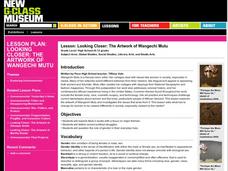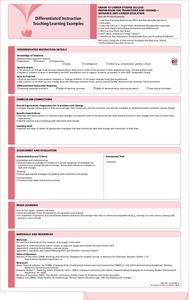Curated OER
Gender Stereotypes and Body Image
Students discuss and become aware of the dangers of gender stereotyping and the media's role in perpetuating gender stereotypes. They view magazine advertisements and make entries in their journals after guided discussion.
Advocates for Youth
What Are Stereotypes and Gender Roles?
Living up to what society expects of you is difficult enough before you add the complications of sexual and racial prejudice. Discuss the difficulties faced by people in your country, neighborhood, and classroom with a series of...
Curated OER
Lesson: Looking Closer: The Artwork of Wangechi Mutu
Social issues of gender and media stereotypes, begins with a multi-sensory experience. Learners view the painting Backlash Blues and make critical comments based on what they see. They then read the Langston Hughes poem and listen to the...
Anti-Defamation League
The Gender Wage Gap
"Equal pay for equal work!" may sound logical but it is not the reality. High schoolers begin a study of the gender wage gap with an activity that asks them to position themselves along a line that indicates whether they strongly agree...
Read4Health
Piggybook: A Read4Health Lesson Plan
"You are pigs." With those three simple words, the lives of the Piggott family were changed forever. Read aloud the children's story Piggybook by Anthony Browne and teach your class the importance of personal responsibility, learning...
Curated OER
TV Tells it All
Students discuss the concept of gender bias and stereotyping. In this social science lesson, students determine what the influence of television on gender roles represents and compares the chage in gender roles of today to those of their...
C3 Teachers
Call for Change: What Did It Take for Women to Be Considered “Equal” to Men in New York?
An inquiry-based lesson challenges fourth graders to examine who had voting rights in New York when it was founded, women's roles, and how they entered politics. Scholars participate in thoughtful discussions and show what they know...
Curated OER
The True Confessions of Charlotte Doyle
Young scholars examine the breaking out of traditional gender roles in this story by Avi Wortis, The True Confessions of Charlotte Doyle. Gender limitations are explored in this lesson.
Center for Civic Education
In the Shadows, Agents of Change
Most of your learners have probably heard of Martin Luther King, Jr., or Cesar Chavez, but could they also recognize the names of Betty Friedan or Dolores Huerta? Give your learners the opportunity to discover the many accomplishments of...
EduGAINs
Preparation for Transitions and Change— Guidance and Career Education
Every hopeful in your class has gone through some kind of life change, from parents' divorce to a death in the family to moving up into another grade. Encourage them to discuss these changes, the skills they used and acquired during...
Curated OER
The Homefront: America and WWII
Young scholars are introduced to the experiences of various groups of Americans at home during WWII, highlighting race, gender, and ethnicity. They improve their ability to analyze and interpret historical documents and images.
Curated OER
OBSERVING THE ROLES OF MALES AND FEMALES IN THE NURTURING OF THE YOUNG THROUGHOUT THE ANIMAL KINGDOM
Pupils watch animal videos to identify and compare the male/female roles of different species of animals. They draw conclusions and compare those roles to those of humans. They discuss how the human male/female roles have changed...
Center for History Education
Women's Rights in the American Century
Today, many young people find it hard to understand why it took over 150 years for women in the United States to get the right to vote—why there was even a need for the suffrage movement. As they read a series of primary source...
Curated OER
Fairy Tales
Class groups examine fairy tales from a feminist and a Marxist perspective, identifying how these tales present gender roles and class/power systems. The groups then script and perform their own tale that uses one of these lenses.
Roy Rosenzweig Center for History and New Media
The Revolutionary Times as Seen Through the Eyes of Women
The role of women before and during the American Revolution changed dramatically. To gain an understanding of these changes, middle schoolers analyze primary source documents, including letters from women that supported the patriot cause...
Curated OER
Japanese Women - ESL Style
Students read two articles discussing traditional and modern gender roles in Japan. Students complete a worksheet and participate in a discussion about the articles, clarifying some of their own opinions about gender roles.
Curated OER
The Changing Role of Women
Students reflect on the Queen Mother of England's life and how the role of women has changed over her lifetime. In groups they research and report back on a variety of specific topics related to women's changing role in society.
NPR
Partners In Winning The War Lesson Plan
How propaganda was used to change the concept of women's roles during World War II is the focus of an online exhibit provided by the National Women's History Museum. Packed with propaganda posters and pictures, the packet points out how...
PBS
“He Named Me Malala”: Understanding Student Activism Through Film
Malala Yousafzai has become the face of social activism. After watching He Named Me Malala and short student-made films about what young people can do to become instruments of change, class members reflect on what it means to be an...
Anti-Defamation League
Harriet Tubman on the $20 Bill: The Power of Symbols
How important are symbols and symbolic gestures in society? Middle schoolers have an opportunity to analyze the importance of symbols on American currency with a lesson that investigates the controversies surrounding redesigning the $5,...
Tennessee State Museum
Understanding Women’s Suffrage: Tennessee’s Perfect 36
Tennessee was the pivotal state in ratifying women's suffrage in 1920, with its vote coming down to one man: Harry Burn, a 24-year old state representative who changed his nay to an aye on the advice of his mother. Learn more about...
Georgia Standards
Sociology Unit Six: Socialization Within the Group
How do we learn the rules of society? How do beliefs and ideas affect these rules? Introduce your young sociologists to the factors that socialize individuals with a unit that uses observation and experimentation to analyze how factors...
Nemours KidsHealth
Puberty: Grades 3-5
With puberty comes lots of changes to one's body. Scholars explore those changes with two lessons that examine the role of the pituitary gland and hormones. In the first lesson, pupils take on the role of the pituitary gland, write a...
Elizabeth Murray Project
The Education of Women in Colonial America
What educational opportunities were available to women during the colonial era in American history? How did the opportunities available to women differ from those for men? To answer this question, class members examine a series of...

























